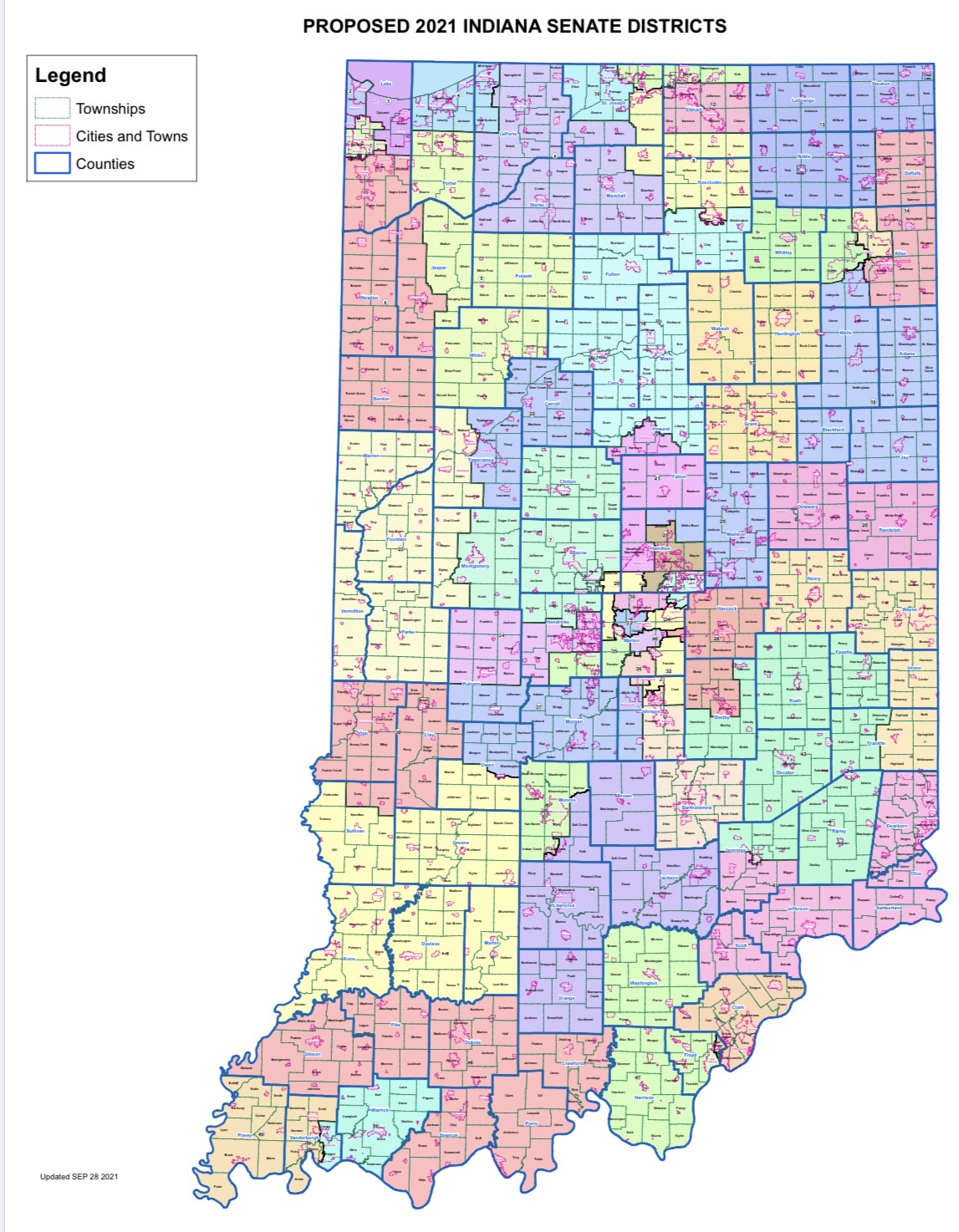
Above: Proposed Indiana Senate districts as redrawn Tuesday.
In a rare moment of bipartisan unanimity — and one that will at least slightly delay this year’s redistricting process — Indiana Senate Republicans on Tuesday further changed their redrawing of eight Marion County districts, an adjustment that they said was spurred from suggestions in public testimony and from Senate Democrats.
The amendment to the Republican-authored redistricting legislation, House Bill 1581, was approved by consent — meaning there were no objections by any of the seven Republican or two Democratic members — by the Senate Elections Committee, which later approved the amended legislation along party lines and sent it to the Senate floor, where debate is expected to begin Thursday.
As a result of the amendment, the legislation, if passed by the full Senate, would need to return to the House, which could either concur with the changes or send the bill to a conference committee to resolve the differences. House Speaker Todd Huston, R-Fishers, told House members last week to be prepared to return to the Statehouse Friday afternoon — after the bill’s expected passage by the Senate Friday morning — if a concurrence vote were necessary.
The bill’s Senate sponsor and author of the last-minute amendment, Sen. Eric Koch, R-Bedford, said it resulted from public input during Monday’s public testimony before the committee and his caucus’ examination of the map proposed by Senate Democrats.
“After our districts were initially drawn, we examined the maps drawn by Senate Democrats,” Koch told the committee. “We hired an academic expert,” whom he later identified as Dr. Brad Lockerbie, a political science professor at East Carolina University.
The redrawn map, Koch said, resulted from Lockerbie’s confirmation that “racially polarized voting does not exist in Marion County” due to white voters’ historically supporting the election of Black candidates.
“Because of that,” Koch said, “the Voting Rights Act does not require ‘majority minority’ districts in Marion County,” or districts drawn to have a predominantly Black population to comply with federal law.
The biggest changes from the amendment involve Senate District 29, represented by J.D. Ford; and Senate District 30, represented by Fady Qaddoura, both Democrats.
None of the changes appear to shift significantly the existing political balance within any of the districts.
Also affected were Senate District 20 in Hamilton County, represented by Scott Baldwin, R-Noblesville, which was changed only by a single precinct; District 31, represented by Kyle Walker, R-Indianapolis; District 32, represented by Aaron Freeman, R-Indianapolis; District 33, represented by Senate Minority Leader Greg Taylor, D-Indianapolis; Senate District 34, represented by Jean Breaux, D-Indianapolis; Senate District 36, represented by Jack Sandlin, R-Indianapolis; and Senate District 46, which would be an open seat shifted from southern Indiana.
Not affected was Senate District 28, represented by Michael Crider, R-Greenfield, which has faced the sharpest criticism of any district that includes Marion County; the district population is predominantly in rural Hancock and Shelby counties but includes a portion of the Indianapolis Eastside so small that critics say it marginalizes its Democratic and minority population. Nor did the amendment affect districts elsewhere in the state, despite testimony Monday that included allegations of racial gerrymandering in Lake and Allen counties.
Before its approval of the bill, the committee voted down other proposed amendments from Qaddoura or Ford to put an independent commission in charge of map drawing in the next decennial redistricting cycle; to redraw the state’s congressional districts with the focus on making Congressional District 5 more competitive, and to require a 30-day “public review” between the introduction and further legislative action on redistricting legislation. The amendments were voted down along party lines except for the one proposing the independent commission, which picked up a vote from Sen. Ron Grooms, R-Jeffersonville.
The two Democrats on the committee also withdrew other amendments — including one that would have redrawn Senate districts in Allen, Marion, Tippecanoe and Vanderburgh counties where “districts were egregious divided for political gain,” Ford said — because they would have conflicted with the already approved amendment from Koch, meaning that a previous version of the legislation would have been amended. The Democrats indicated that they would redraft and propose those amendments for second-reading consideration of the bill on the Senate floor Thursday. — The Indiana Citizen